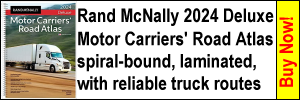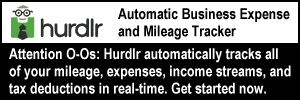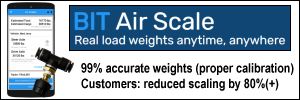A Facebook post about this article about an SUV that rear ended a parked truck received a response.
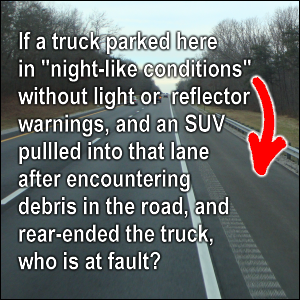 We made another post that we feel compelled to share below.
We made another post that we feel compelled to share below.
Before we go farther, we sorrow that people died in this accident.
Disclaimer: We have no access to any of the documentation concerning this accident and obviously weren’t there to see it first hand. We are not in a position to render legal advice nor can we render a verdict in this matter.
But we like to look at matters as objectively as possible and Vicki has a knack of asking questions that make people think.
In light of that, here is the pertinent part of the rear-ended Facebook response post.
Feedback on a Truck Being Rear Ended
There is no indication in the article that the trucker had set out his emergency triangles. The article stated, “In their deliberation, the jury agreed that the girl’s father was also negligent, but determined his actions were not a substantial factor in causing his family’s deaths.”
However, we have a few questions to ask.
- If a truck is parked on the shoulder, completely out of the lanes of travel, why doesn’t the driver of another vehicle know that he/she has moved out of the lane of travel when he/she rear-ends the truck?
- If the driver of a vehicle — no matter what size — comes up on stopped traffic in the lanes of travel (such as during heavy rush hour traffic), is unable to stop and rear-ends the vehicle in his/her lane of travel, who is at fault for the accident?
- What is the difference between the two scenarios above besides the location of the stopped vehicle that is hit?
- If a car rear-ended another car pulled over on the shoulder of a road, who would be at fault?
- Isn’t it likely that the reason why the truck driver in the article linked above was blamed for the accident was because he was driving a big truck and nothing else?
These questions are food for thought. Thanks.
Other Accidents Where Vehicle Hit From Rear
Numerous documents on the FMCSA’s website provide historical info on Large Trucks in Crashes by Crash Type and Severity.
Yes, some trucks have rear ended other trucks:
- 2007 on I-80 in Oregon(1)
- 2013 on I-39 in Illinois(2)
- 2013 on Route 1 in Maryland, in which the box truck “rear-ended a tractor-trailer” that was “stopped or slowing in traffic” and the box truck driver died. (link)
Here is a search link for accidents where a car rear-ended a truck.
Getting Specific
According to Wikipedia’s article on a rear-end collision:
For purposes of insurance and policing, the driver of the car that rear-ends the other car is almost always considered to be at fault due to not leaving enough stopping distance or lack of attention. An exception to this rule comes into play if the rear-ended vehicle is in reverse gear. If the driver of the car that was rear-ended files a claim against the driver who hit him, said driver could be responsible for all damages to the other driver’s car.
If rear ending a parked truck is the fault of the driver in the rear vehicle — except when the truck is in reverse — why should that not hold true even when a vehicle is parked in an emergency or breakdown lane?
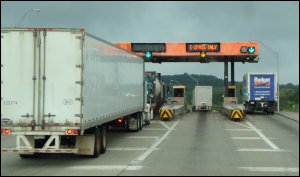 Would it have mattered if the driver that rear ended the parked truck had done so after the truck
Would it have mattered if the driver that rear ended the parked truck had done so after the truck
- had had a steering wheel blow-out?
- had experienced mechanical trouble that rendered the truck inoperable?
The article does not say what form of punishment resulted from the trucker and his trucking company being “deemed negligent” in this situation.
But let’s pursue this a bit more because we’ve had both
- “parking on shoulder” situations and
- “stopped on the road” situations when traffic congestion was so thick that no one was moving, including at toll booths (as shown here).
Our Experiences Where We Could Have Been Rear Ended
Not counting the many, many times when we’ve slowed or stopped the truck in heavy traffic on the road — or when approaching a toll plaza — we’ve had some experiences where we’ve had to park on the shoulders of roads or ramps over the years.
Here’s a summary of them with a bit of commentary.
| Situation Where We Could Have Been Rear Ended | Location | Preventable |
|---|---|---|
| Truck lost part of driveline while Vicki was driving for U.S. Xpress in the Greensboro, NC, area. Truck was supposed to have been serviced (and lubricated) over Christmas break, but had not been. Had to wait for a tow truck. | Road shoulder | No |
| As we describe on our budgeting page, we ran out of fuel in the greater Atlanta area and had to wait for a service vehicle not only to provide fuel but to recharge the batteries (because the flashers ran so long that the charge was way down). | Road shoulder | Yes |
| Trucks that blew a turbo. Without this part of the truck running, power is very limited. Had to wait for a tow truck each time. More info about one situation is on our semi truck repair page. | Road shoulder | No |
| When making an emergency bathroom break (using our in-truck portable toilet). | Ramp shoulder | No |
| When communicating about load changes with driver manager over QualComm. | Ramp shoulder | Not when load canceled en route. |
Although we’ve had numerous blown tires through the years, we’ve never experienced a steering tire blow-out.\
Were we to have one, this situation could also render the truck inoperable.
Guilty of Negligence?
In some of the situations listed above, we’ve had to park on the side of the road or ramp because of mechanical problems — problems that we could not have foreseen or done anything to prevent.
Even in a case where a trucker makes an error — such as by running over something in the road that causes tire damage that renders the truck inoperable — should that automatically make him or her guilty of “negligence” if a vehicle approaching from behind ends up causing a rear end accident involving the slowing, stopped or parked truck?
Legally speaking, what is “negligence”?
UpCounsel says in part:
The failure to use reasonable care. The doing of something which a reasonably prudent person would not do, or the failure to do something which a reasonably prudent person would do under like circumstances. A departure from what an ordinary reasonable member of the community would do in the same community.
The Legal Dictionary part of TheFreeDictionary.com says in part:
Conduct that falls below the standards of behavior established by law for the protection of others against unreasonable risk of harm. A person has acted negligently if he or she has departed from the conduct expected of a reasonably prudent person acting under similar circumstances.
In order to establish negligence as a Cause of Action under the law of torts, a plaintiff must prove that the defendant had a duty to the plaintiff, the defendant breached that duty by failing to conform to the required standard of conduct, the defendant’s negligent conduct was the cause of the harm to the plaintiff, and the plaintiff was, in fact, harmed or damaged.
To Help Prevent Being Rear Ended After You Stop Your Truck
In a June 2012 news release, a law firm stated in part (emphasis added):
Although a rear-end accident caused by a commercial truck is more common, collision of a passenger car into a truck is more likely to result in fatalities. The study conducted by the FMCSA found that this type of accident was more likely to occur when visibility was diminished, such as during the evening.
The increased occurrence of these accidents at night may be connected to the visibility of commercial trucks. Researches with FMCSA noted that trucks involved in this type of accident were often in violation of lighting regulations. As a result, it may not be easy for the driver of a passenger car to see the commercial truck, let alone notice that it has stopped or slowed.
Although the driver of the impacting vehicle is generally liable for rear-end collisions, in cases like this there is a strong argument that the commercial truck driver is at least partially responsible. If the commercial truck was in violation of lighting regulations the company or driver may have contributed to the accident.
In addition to faulty brakes and lighting violations, other factors that can contribute to commercial truck accidents include:
– Driver of the truck received inadequate training
– Compensation based on faster delivery leading to focus on speedy delivery of product instead of safety
– Unrealistic schedules that lead to fatigued drivingAny of these factors can result in liability on the part of the commercial truck driver or company. As a result, those injured in these accidents are likely eligible to receive compensation to cover medical and rehabilitative expenses.
A December 2013 news release from Houston truck accident injury lawyers states this:
…when a truck driving fatality occurs due to a driver not following safety precautions, a wrongful death claim may be filed on behalf of the injured victim. Survivors of those whose lives have been lost in this type of tragic occurrence may be eligible to file a claim for compensation for related medical costs, funeral expenses, economic losses, loss of companionship, or other damages they may have incurred.
www.wiredprnews.com/2013/12/03/truck-accident_2013120336311/ (no longer online)
What kind of “safety precaution” or “visibility” situation is being described here?
To avoid being rear ended, this could possibly mean having the truck’s flashers on.
The FMCSR addresses the use of flashers in § 392.22.
Another Look
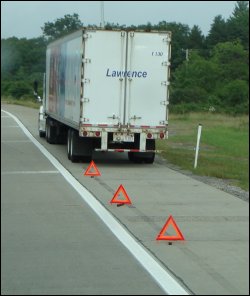 The article about the SUV that rear ended the large truck stated:
The article about the SUV that rear ended the large truck stated:
In addition, both the trucker and the California-based trucking company were deemed negligent for parking on the side of the freeway in night-like conditions without setting up any light or emergency reflectors around the rig.
Assuming the trucker had not stopped long enough to put out his triangular reflectors, if he had had his flashers on — and the article doesn’t say whether he did or didn’t — perhaps the SUV driver would not have rear ended his truck.
This is purely speculation.
Assuming that the trucker had his medication within easy reach while driving, having ingested it while driving could have set up a distracted driving situation. (Reference our eating while driving page.)
![]() Money saving tip: Do the “reasonable” and “reasonably prudent” thing to avoid setting up a rear-ending situation.
Money saving tip: Do the “reasonable” and “reasonably prudent” thing to avoid setting up a rear-ending situation.
This could be while you’re driving your rig or parked.
This could be in terrain where your truck is going slowly.
This could be in various weather situations (including fog, smoke and snow).
Think proactively.
If necessary, think like a prosecuting attorney who loves to make truckers’ wallets bleed.
While state laws may vary regarding the use of flashers, use them wisely anytime you’re slowing or stopping — in or near traffic.
It is better to be safe than be rear ended.
Should you ever be involved in a situation when your truck is rear ended, we recommend that you have a trucker attorney and a trucker legal plan in place to defend you.
Whenever possible, seek a non-emergency place to park your truck. Plan ahead as much as possible.
If you are prone to having health situations that require medication while you are driving — bearing in mind that the trucker in the article pulled over to “take medication in order to quell a severe headache” — you may wish to plan ahead.
Also, you may want to evaluate your diet and lifestyle to see if there are positive changes you can make to your trucker health.
Consult your trucking company’s policies, employee handbook or Safety Director for more guidance about how to prevent being rear ended.
Return from On Being Rear Ended in a Truck to our Truck Operations page or our Truck Drivers Money Saving Tips home page.
References:
1. journalstar.com/news/state-and-regional/govt-and-politics/truck-driver-dies-in-crash-with-another-semi/article_fbce2c43-fae5-5779-b4f6-91cd7c0a76bf/
2. oglecountynews.com/2013/08/02/semi-truck-hits-rear-of-another-semi-truck-and-trailer-on-i-39/aa913f2/ (no longer online)

